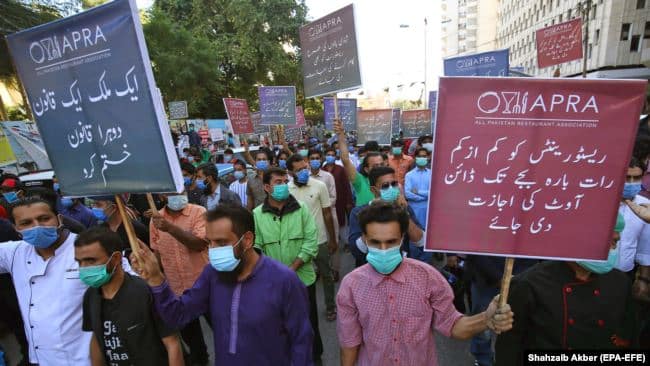When Bilawal Bhutto Zardari, a leader of the opposition Pakistan Peoples Party (PPP), announced late last month that he was self-isolating after contracting the coronavirus, sympathy and get-well messages poured in. While wishing him a speedy recovery, a provincial minister in the northwestern province of Khyber Pakhtunkhwa scolded him for taking part in an opposition rally in the provincial capital, Peshawar, on November 22 that violated a government ban on large gatherings to stem the spread of COVID-19. “To everyone sitting on stage at the PDM gathering, if in Pakhtunkhwa please call on 1700 KP Covid helpline and get yourself tested through our rapid response teams,” Taimur Khan Jhagra, the provincial health minister tweeted at the PPP leader while referring to the Pakistan Democratic Movement, an opposition alliance, by its acronym.
But a few days later on December 6, Jhagra was in hot water after six Covid patients died in Peshawar’s government-run Khyber Teaching Hospital (KTH) because of a delay in sourcing oxygen, according to an initial investigation by the government. “We will take action and learn from this tragedy to improve our [healthcare] system,” Jhagra told journalists late on December 6. The next day an initial government probe suspended seven KTH employees held responsible for the oversight. But opposition leaders wanted Jhagra to take the blame. “Criminal charges must be brought,” wrote Farhatullah Babar, a senior PPP leader. He said that Jhagra and the hospital’s board of governors and other officials should resign, saying what happened amounted to “unacceptable inefficiency.”

This controversy is part of an intensifying battle between PM Imran Khan’s Pakistan Tehreek-e Insaf (PTI) led government and the PDM. As the PDM intensifies its campaign to topple Khan’s government through protests, his administration has invoked COVID restrictions to stop the opposition’s campaign. Both have accused each other of playing politics over the deadly disease that has killed more than 8,000 Pakistanis since March. “Everyone knows Covid spreads when people gather, as doctors and nurses are saying that the burden of patients has increased at hospitals with as many as 70 deaths in a single day,” Khan told a gathering last week. “Yet the PDM is holding public meetings against the government only to hide their ill-gotten money,” he added while repeating his claim that the PDM’s campaign is nothing more than a ploy to hide the corruption of its leaders. “Please tell me: How intelligent is the coronavirus?”
Maryam Nawaz, a senior leader of the opposition Pakistan Muslim League Nawaz (PML-N), asked a charged PDM rally recently. “Does it only spread at opposition gatherings and stays away from government functions? They are only trying to impose a lockdown on the opposition, but the Pakistani people will impose a lockdown on Imran Khan.” Nawaz repeated a PDM line that forcing Khan out of office remains the main opposition objective at all costs. “Before dealing with Covid-19, it is important to deal with COVID-18,” she said, alluding to Khan’s victory in the July 2018 parliamentary election. PDM leaders claim the vote was rigged by the country’s powerful army generals in the PTI’s favor. The PTI and the Pakistani military denied the allegations.
A Pakistani Army spokesman recently denied any involvement in politics. The intensifying political deadlock is not good news for Pakistan. Government data shows that the number of COVID-19 cases has steadily increased since early November, which indicates the country is moving toward a peak in the second wave. On December 6, the country of 220 million recorded some 3,795 positive cases out of a total of over 39,000 tests. With 37 deaths that day, the overall number of deaths stands at is 8,340.

The increase in infections means major hospitals across the country have surpassed their capacity. Anecdotal evidence paints an even grimmer picture of people largely ignoring the government advice or refusing to take the disease seriously altogether. Following up on his administration’s policy of avoiding a general lockdown, Khan remains adamant that a general lockdown would shock the country’s ailing economy and negatively impact the most vulnerable among its burgeoning poor. This has some in the country fearing the worst is yet to come. “The politicization of the coronavirus is therefore probably one of the most dangerous misadventures we are indulging in,” wrote Fahd Hussain, a newspaper editor. “There is nothing to stop the virus from wreaking havoc once again.”
Hussain says that bold decisions by the federal and provincial governments to enforce closures and embracing behavioral changes by the citizens can help. “Pandemic politics is disallowing both,” he noted. Across Pakistan, apart from a few “smart lockdowns,” life goes as normal. Mask wearing, in particular, is limited while hygiene and keeping social distancing have always been difficult in a society build around shared spaces and practices. On December 7, Nawaz held large rallies to mobilize her support base in the eastern city of Lahore in the lead-up to a major PDM rally on December 13. In a meeting on December 8, the alliance’s leaders are widely seen as embarking on even more protests in the face of an expected showdown with the government.

